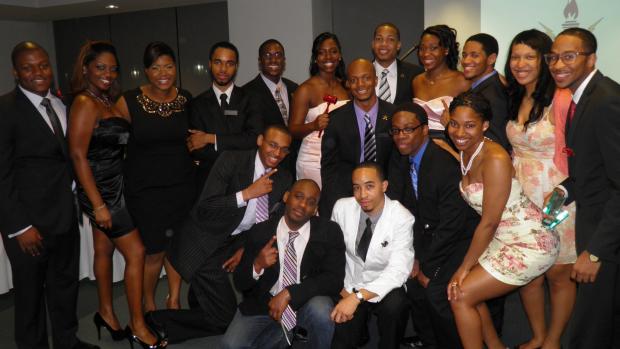Student Engineers Paying it Forward
The NYU-Poly chapter of the National Society of Black Engineers talk mentorship, support systems and looking to the future

During National Engineering Week and a February-long celebration of Black History Month, NYU-Poly highlights the legacy of its alumni and the continued impact of the African-American community on the Institute.
"We LAUGH, we EAT, we STRUGGLE…we're a family and we're a support system."
So said the Facebook status of the student chapter of the National Society of Black Engineers (NSBE) last week. And they mean it. The chapter, founded at the Polytechnic Institute of New York University in 1979, plans bowling get-togethers, résumè boot camps, and study "jamz" on a regular basis, because “studying engineering is rough," says Sukari Brown, the chapter's president and a third-year civil engineering major. They keep each other motivated, bringing a social dynamic to what could otherwise be a solitary experience.
Brown's comment resonates more than ever these days with educators and policy makers. Sharing a similar national student sentiment, the New York Times reported late last year that roughly 40 percent of those who enter college planning to major in science or engineering end up changing their mind or not getting a degree at all. And, according to the National Science Foundation in, African Americans' representation in science and engineering occupations in the United States is notably lower than in the workforce as a whole, with engineers comprising a smaller percentage than their scientist counterparts. Campus organizations like NSBE can be a key component in the country's struggle to bolster the number of students receiving science and engineering degrees, a figure that's flat-lined in the last 25 years, even as the number of college students have increased by 50 percent.
"As a minority student, you have external challenges that you can't control," says Brown. "It's good to have someone you can refer to as an example say [to you], 'Hey, listen, I struggled just as much, but I was able to come out and get a great job.'"
The leaders of PolyNSBE make sure that students find that special brand of mentorship that happens between budding engineers still in the throes of university life and professionals out in the field by inviting successful alumni back to campus. Just this month, for example, PolyNSBE Alumni, Calvin A. Young, III, an Operations Leadership Associate at United Technologies Corporation (UTC), met with group members, who, in turn, extend the same kind of mentorship to younger students: The group boasts a Big Brother/Big Sister program that connects upperclassmen with incoming students. The older students work to acclimate the newbies successfully to university life. The organization also reaches out to local high schools, where members offer tutoring and other services, like helping students complete college applications.
Brown herself is a product of that outreach. A NSBE participant since 2005 when she was still at nearby Brooklyn Technical High School, Brown says the organization’s supportive members helped bring her out of her shell. Her high school-self was "shy and timid," says Brown, but taking on leadership positions in NSBE—the junior is a quality-control analyst for the finance committee of the national organization and was an internal vice president of the student chapter last year—developed her presentation skills and boosted her self-confidence. "If you're looking to advance your future and be prepared for the real world," she says today, "NSBE is the place to go."




